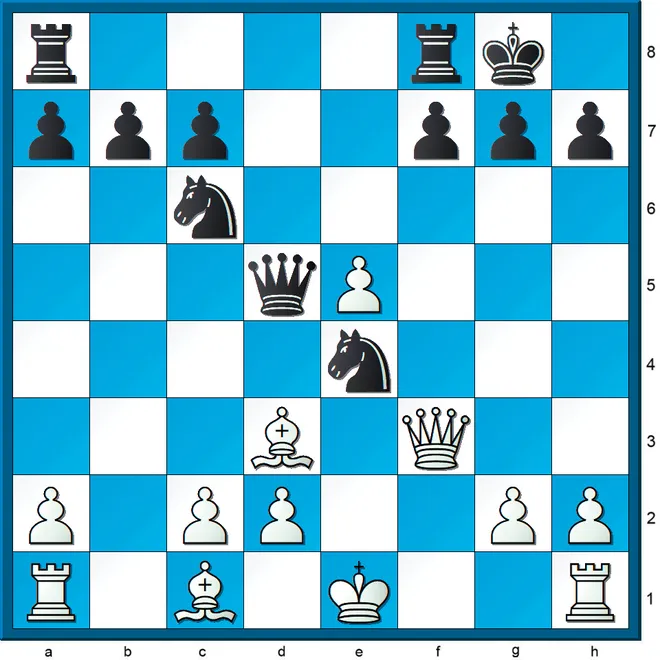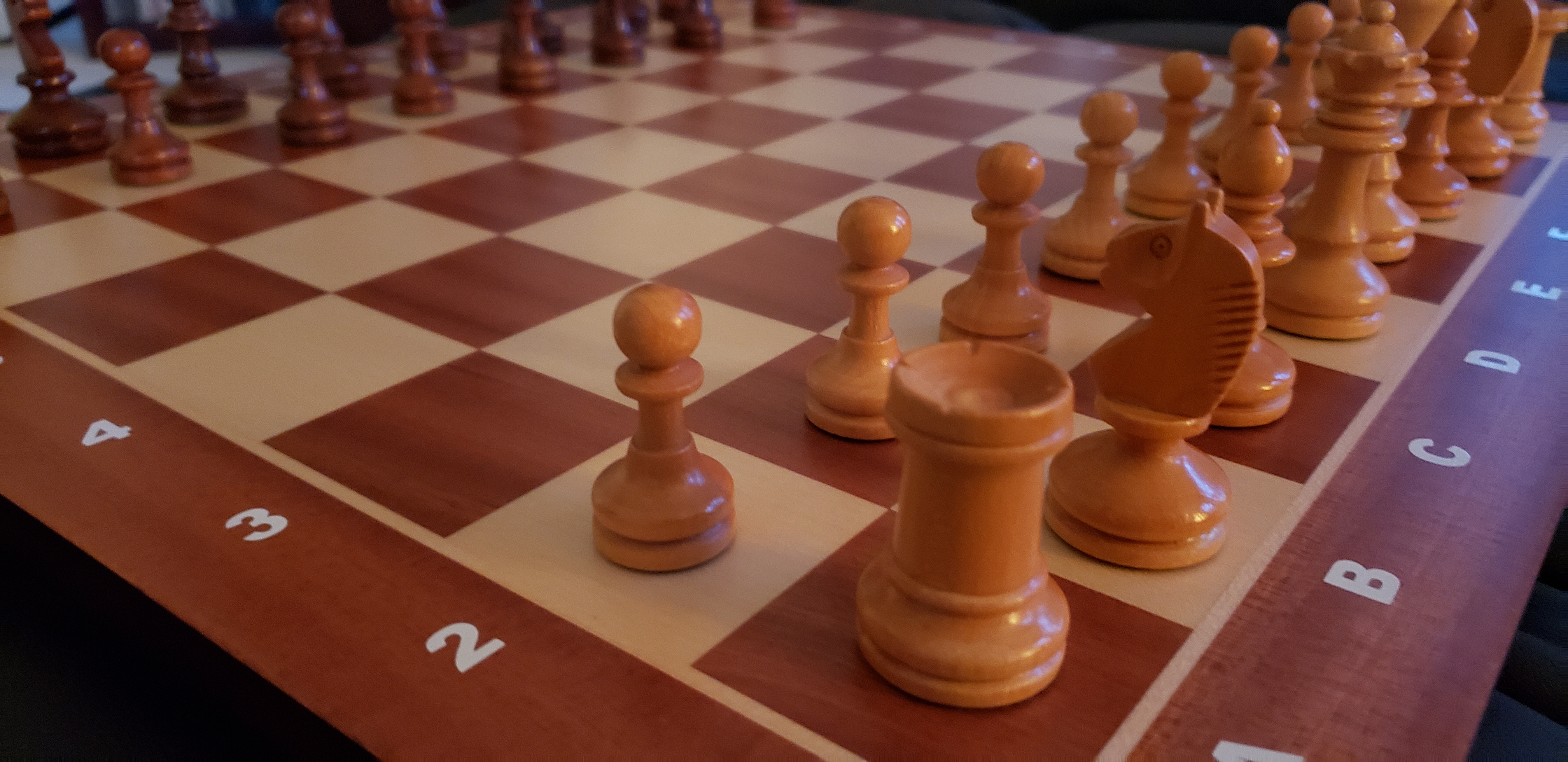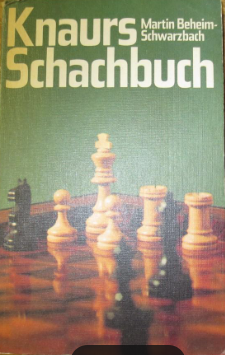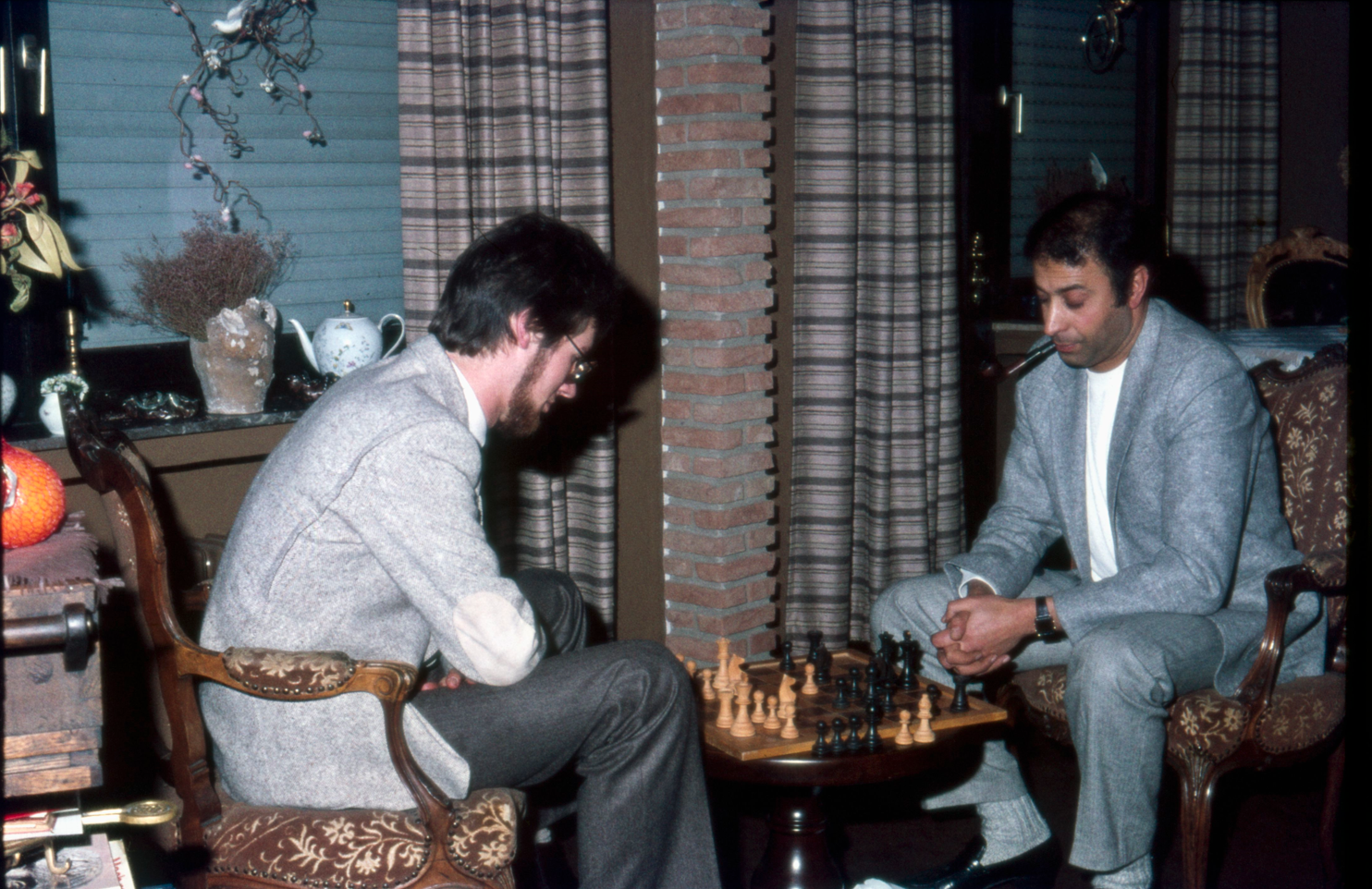In my blog last week about the Electronic Knights 2021 tournament results so far, reflecting on all games, I made this provoking call:
- Does anyone still doubt that playing chess keeps you young?
- Does anyone still doubt that a senior chess player cannot improve?
This blog is a personal bio excerpt focusing on the chess part of my life. I will cover one of my latest games against Valeriy Khanas, a Ukrainian International Correspondence Chess Master (IM), and last but not least, inform you about some exciting changes/add-ons on my web page.
Once Upon a Time
My initiation into the world of chess was a childhood memory, a gift from my dad when I was merely five years old. The chessboard and pieces were humble, a part of a game collection that included checkers and other companions, all for the simple joy of play. However, my dad, my first chess mentor, left this world too soon, succumbing to his third heart attack in 1971. This year, he would have celebrated his 100th birthday in November, and I often find myself wondering what he would think about today’s chess world — a thought that brings a gentle smile to my face.
Later, the original inexpensive chess pieces were replaced by a set handcrafted by Santa Claus himself, with a price tag of 46 Deutsch Marks — a substantial sum at the time in the mid 1960’s. Regrettably, funds were scarce for a luxurious board, so the troopers of the chess army found their place on a more affordable battlefield.
After 60 years, these once-modest chess pieces found a new home on a splendid, handcrafted, full-wooden board, sparking a renewed excitement among the ranks.
I have never played in a chess club in Germany, but I played against some members of chess clubs. Also, I never played real competitve chess. However, the Fischer boom, Helmut Pfleger and Vlastimil Hort, and their Schach der Großmeister - a German television show - influenced me. There was literally no TV broadcast I missed. At a time when there was no streaming and no video recording, that means a lot.
Bobby Fischer was different; it was East versus West in the middle of the Cold War. The chess match between Bobby Fischer and the Russian defending champion Boris Spassky still fascinates me today; it is indeed a “Match of the Century” that continues to have an impact to this day.
During my night shifts, when I worked as a chemical technician to finance studying chemistry at the University of Essen and making a living, I played chess with my colleagues during breaks, which was kind of competitive because, like chess hustlers today, we played for some money.
Within the family, my godfather was able to play chess. He thought he was good; I never said he was not. Every Christmas, we played some games or during some visits to my grandma’s house, where he lived with his family.
Talking about family. At that time in the mid sixties and following, there have been two different newspaper in my hometown Dorsten. Both had for every weekend a chess puzzle and a chess game, sometimes with annotation, but at least a short introduction to set the context. While we had one newspaper my aunt had the other edition, she collected each week those games and I picked them up. I re-played every game and solved every chess puzzle every week.
My first chess book I bouhgt was 1972, Martin Beheim Schwarzbach Knaurs Schachbuch - Ein Jahrhunder Schach in Meisterpartien, in English ‘Knaur’s Chess Book - A Century of Chess in Master Games’.
I literally played EVERY game multiple times to recoginze patterns and the ideas behind moves in the middle and endgame.
Mr. Beheim-Schwarzbach unique very entertaining writing style really caught me.
The same style has Dr. Helmut Pfleger and since today, he is writing a weekly chess column, which I highly recommend, even when it is in German language. Here an example (translated into english):

Does anyone else have any doubts that playing chess keeps you young? At the German Senior Team Championship OVER 65 in Böblingen, the North Rhine-Westphalia II team won the bronze medal with the veteran warriors Erich Krüger (91) and Willy Rosen (90). While Krüger had recently become German Nestor Champion (from 75), this time his friend and club colleague in Essen-Katernberg, Willy Rosen, was supposed to play a special role. For the first time he played together with his son Bernd, who had just turned 65, in the senior team - with "Papa" Willy being almost as good with 5 points from 7 games as Filius Bernd with 5 from 6 at the top board. What both found to be a “pretty unique thing,” as Hartmut Metz writes in Schach-Magazin 64. Why “quite”? Are the two of them already thinking about the next championships up to the hundredth?! There seems to be little to stand in the way of this, especially since dad now always wears a helmet after a bicycle fall in 2020. The final all-clear was given when he scored 2.5 points from three games against Erich Krüger at their weekly meeting: “Everything had to be okay!” Finally, the decisive battle of the last round against the former bridge world champion Georg Nippgen from Baden (who still became champions). What cunning triangular maneuver did Willy Rosen use to gain a decisive advantage as Black's turn?
Click here for the original full german version from Zeit Magazine.
I mean, age 90+? Any questions?
My second chess book was a gift from a friend, Robert Lesniak, a member of a local chess club. He bought one of the first chess computer in the 1980’s. I don’t remember the model/company, but I have in mind it was strong.
Lehrbuch der Schachtheorie, Aleksei Suetin, Sportverlag Berlin 1978
I mentioned this in a previous blog
The Road to ELO 2000 - Unlearning and Rediscovering Openings, but like to repeat here that I often went back to the two books he gifted me, Aleksei Suetin, Lehrbuch der Schachtheorie (there might be other languages than German still around). From what I learned is such books are simply timeless and age very well.
My brother-in-law, Sleh Badoui, was a fantastic chess player, and we played very often. Sleh studied art and graphics at Sorbonne in Paris and lived in the Netherlands but was born in Tunis. He passed away from cancer. Here a picture from the archive where we played a game at his house.
How did playing chess influence me? Well, who knows, but chess is often associated with improvements in cognitive skills like memory, planning, and problem-solving. It’s also been suggested that being good at chess can make you better at math or chemistry and vice versa. This is because both chess and math or chemistry are based on logic and well-defined rules. In fact, many elements of chess can be explained by mathematical concepts, which range from simple to complex.
However, being good at physics and chemistry doesn’t necessarily mean you will be good at math or chess, as there is more to math than the calculations done in these fields. Nevertheless, good math skills can potentially help you take your chess game to another level and vice versa.
Studies show that the critical thinking and problem-solving skills you develop from playing chess could potentially be beneficial in studying subjects like chemistry.
I embarked on a chess comeback in 2020 after a 25-year hiatus from the game. Despite the long break, my passion for chess was rekindled, and I quickly immersed myself in the world of chess, determined to make my mark once again.
And it goes on
Since my return, I’ve achieved significant milestones in correspondence chess. My imminent second norm in correspondence chess with the ICCF underscores my ability to strategize and execute plans meticulously over extended periods.
Breaking through the 2000 Elo rating in USCF within a short time frame is a testament to my innate chess skills and relentless pursuit of improvement. My participation in the Electronic Knights 2021 semi-finals showcases my adaptability to the modern chess landscape and my competitive spirit.
Even as a chess veteran who returned to the game after a quarter-century break, I fearlessly ventured into the ICCF Veterans World Cup semi-finals, demonstrating that age is no barrier to achieving success in this intellectually stimulating pursuit.
I also signed up for the ICCF Veterans World Cup 14 and just finished a game against the Ukrainian Internation Master Valeriy Khanas (2384)
Valery is a well-known and very experienced player. Given the situation in Ukraine, how he plays and who plays during these uncertain times is even more impressive.
So, I thought, for this blog, I will share the game with you.
Details about Valeriy:
Valeriy Khanas is an International Correspondence Chess Master (IM) with a rating of 2353. He has completed 961 games, winning 157 of them, and has played 3668 moves in 90 tournaments1. He achieved the title of IM in 2021, Correspondence Chess Master (CCM) in 2019, and Correspondence Chess Expert (CCE) in 2018. He also participated in the ICCF Veterans World Cup 9 Final in 2020 and the Esko Nuutilainen Memorial Team Tournament Final Board 1 Ukraine in 20191.
You can find some of his games on the International Correspondence Chess Federation’s website.
His Chessbase player entry can be found here.
And his impressive ICCF profile is here.
My journey is a testament to the enduring allure of chess and the limitless potential for self-improvement at any age. I remain deeply committed to chess, continuously honing my skills and embracing this timeless game’s challenges.
And October 2023 marked the next milestone and achievement: I was ranked nr. 90 in the top 100 US correspondence chess players.
Update on Blog Page
As you can see, I not only like books but learn from chess books too. And keep them forever. Also, I believe the weekly newspaper chess columns made a key difference and I still use this technique. So, the idea is why not share this with you?
The Weekly Puzzles and Games tab on the blog page brings you to a weekly puzzle and a weekly game position, starting from Week 50 from now on every Friday, the Weekly Puzzles & Game. But that’s not all, the puzzle is not just a puzzle. You get help from Fritz. Who is Fritz? Fritz is the chess playing entity with by far the biggest opening repertoire on this planet. New theory is available soon after it has been played in a grandmaster game. Thanks to Chessbase I’m able to embedd this for you without any login so you can use it for a training of specific positions or endgames I will publish every week.
See you next Week
As we draw the curtain on this chapter of my personal chess odyssey, let’s gaze both backward and forward. Conclude this journey with a moment of reflection and a glimpse into the chess horizons yet to be conquered. If you are on your journey to improve your chess game, make every move on the board a step closer to the next exhilarating achievement. The chessboard is ever-evolving, and I invite you to be a part of the unfolding narrative.
Amici Sumus
I’d love to hear your thoughts on today’s post. Feel free to share your favorite chess strategy or ask any questions you may have.
Please subscribe











